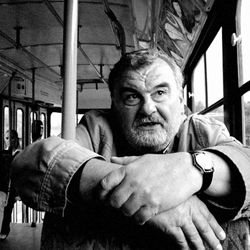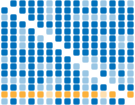The page of Štrpka, Ivan, English Reception
Reception
CHARACTERISTICS OF HIS WRITINGŠtrpka entered literature as a member of Lonely Runners group of poets. His first book The Short Childhood of Lancers is a record of growing tip and a record of the defiance with which a voting soul faces the humiliation of social reality. The next book Tristan Talks Trash deals with empty phrases of political and social Newspeak. Now and Other Islands is a concept, an exploration of man here and now. It points to hidden traps within and without, his history and his competence as the maker of history. In the fourth book Before Metamorphosis the poet trieds to free himself of the heavy burclen of logical thinking and previous experience. Štrpka is obviously reorganizing and repositioning qualities and meanings in new structures thus giving them a completely different and new dimension. News from the Apple reaches into the magical depths of the author’s world, which is multicoloured and full of unresolved mysteries. The book of lyrics The Blue Hill is a rare document of cooperation between the rock musician and film-maker Dežo Ursíny and the poet Ivan Štrpka. It contains all Štrpka’s poems-turned-songs until 1987. The collection entitled Everything Is in a Shell oscillates between a travelogue and grotesque vision with a strong inclination to Eastern philosophies, particularly Zen Buddhism. The poetical composition Beautiful Naked World gives the impression that it was written by a man who looked over his shoulder and suddenly discovered a world full of miracles and fairy tales. Maybe it is an expression of his longing to see things as they used to be: in their natural form. His essays are based on political thought and experiences as chief editor of a literary weekly. Rovinsko, Southwest. Mother’s Death, full of grave and dark tones, is an attempt to evoke trysts with reality from the other side of experience.
ON THE AUTHOR
Štrpka’s poetry certainly is meant for the sophisticated reader because it is not simple. It is an intellectual message that cannot be understood from one poem alone, it has to be read as a whole. (Tomáš Winkler)
Štrpka is obviously the “monolithic” type of author who has his very own opinions, firm attitudes and values but on the other hand he is not immune to literary and non-literary movements. There is a certain tension between his way of processing reality and his way of letting reality influence him. Štrpka grasps reality by using complex poetical apparatus, he does not reduce complexities of reality to a few signs like Stražay, but describes it from different angles almost like a Cubist. He literally uses quadrophonic instrumentation. It is an orgy of punctuation: full stops, commas, colons, dashes, italics and capitals, almost as if the verses cried out while you read them quietly. (Daniel Hevier)
The New Age demands new poetry, sharp and uncompromising vision, and not showers of sweet smelling petals. Štrpka’s poetry is like a film, full of movement and rapidly changing images, with lots of detail and a story. (Štefan Moravčík)
It is very interesting to watch how Štrpka reevaluates his own subject. gives it a new coat and how this redecorated text gains completely different qualities. This becomes even more obvious if we compare Štrpka the poet with Štrpka the lyric writer. While in his rock compositions (in cooperation with Dežo Ursíny) the atmosphere is enhanced by music, in poems he has to achieve the same effect by different means. What Ursíny sings, Štrpka is trying to “explain” in words... Štrpka’s language is condensed and he has everything it takes to make a good poem: wit, idea, invention, elegance, suggestion, conciseness, paraphrase and last but not least, ingenious metaphors. (Ivan Kolenic)
With Štrpka, poetic images are born mainly from inner human longing for “self rejuvenation and constitution in the springs” where “out of the authentic being a reflex of language is continually coming to existence”. Only thus can people live the life of independent individuals rather than collectively anaesthetized monsters. (Eva Jenčíková)




